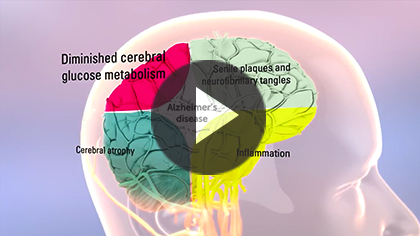Tips when talking to someone with Alzheimer’s disease
Learn how to communicate more effectively with your loved one1
 It’s unfortunate, but people with Alzheimer’s disease gradually lose their ability to communicate and can begin to act in unpredictable ways. For caregivers, this can be emotionally unsettling and the source of a number of difficulties. While keeping the lines of communication open can present a constant challenge, there are ways to make your interaction with a loved one more effective.
It’s unfortunate, but people with Alzheimer’s disease gradually lose their ability to communicate and can begin to act in unpredictable ways. For caregivers, this can be emotionally unsettling and the source of a number of difficulties. While keeping the lines of communication open can present a constant challenge, there are ways to make your interaction with a loved one more effective.
Keep in mind someone with Alzheimer’s disease may be having problems finding words to describe objects. Therefore, they may become anxious or frustrated. You can address their condition by adjusting your behavior when you engage them. Remember, every moment spent with a loved one is precious, so learning ways to improve the way you communicate is worth the effort. Here are several tips for successful communication that will help you get results.
When speaking, keep in mind these helpful tips:
- Identify yourself and call the person by name — Approach from the front to get his or her attention — this helps orient the person
- Use short, simple words and sentences — Keep to the point — don’t overwhelm the person with lengthy requests
- Speak slowly and clearly — Be mindful of speed and clarity when speaking
- Give one-step directions and ask one question at a time — Break down tasks into simple steps using as few questions as possible
- Wait patiently for a response — Give the person the time and encouragement to respond, avoiding criticism or correction
- Repeat the information and only question if necessary — Use the same words as before
- Try to give solutions, rather than ask questions — Say, “The bathroom is right here,” instead of, “Do you need to use the bathroom?”
- Avoid making confusing expressions — Describe actions directly to prevent confusion. Say “Please come here. Your shower is ready.”
- Avoid making vague statements — Say, “Here is your hat,” instead of, “Here it is.”
- Give emphasis to key words — Stress the words you want to draw attention to
- Turn a negative into a positive — Say, “Let's go here,” instead of, “Don't go there.”
- Give easy-to-understand visual cues — Point to or touch the item, or demonstrate or begin the task for the person
- Avoid quizzing and challenging questions — Avoid asking, “Do you remember when?” or “You should know that.”
- Give very simple explanations — Give clear, concise responses — avoid using complex logic and reasoning
- Write notes as reminders or when it’s confusing — Writing a response may help if the person can understand
- Treat your loved one with dignity and respect — Avoid talking down to the person, or as if he or she isn't there
Remember, someone with Alzheimer’s disease has difficulty expressing thoughts, emotions, and understanding others. However, you can apply these helpful tips to more effectively communicate with a loved one no matter how difficult it may become. Experts recommend that sensitive, ongoing communication is an important part of caregiving. And, while someone with Alzheimer’s disease is not always responsive, both you and your loved one can still benefit from continued communication.


